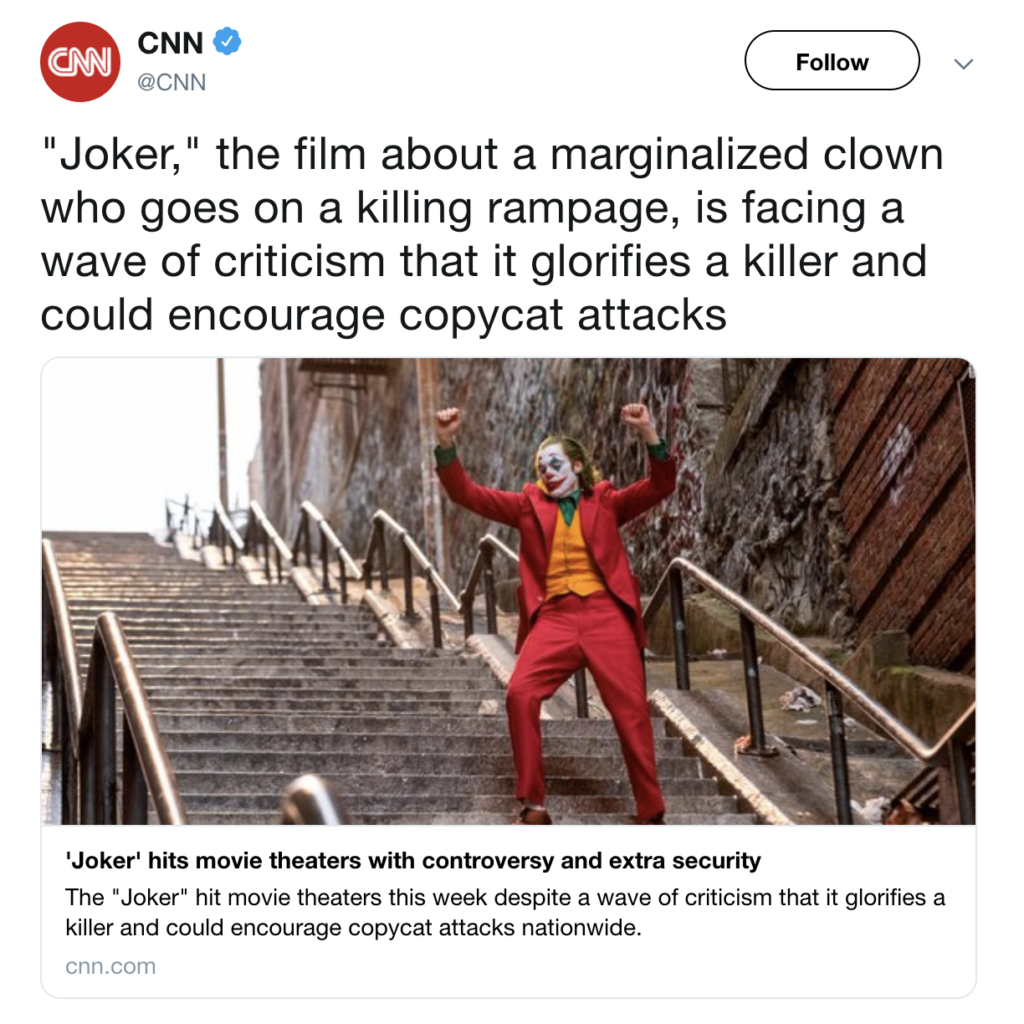Joker: Why So Controversial?
As Joker starring Joaquin Phoenix was released earlier this October, the film was met with a wave of both intense backlash and high praise, making it perhaps the most controversial film of 2019. The main argument from those who oppose the movie is that the violent nature of the film is glorifying a violent killer, and will influence others to become violent or push those who are already mentally unstable towards violence. Could this be a valid concern? After all, America is the leading nation in mass shootings, with 289 so far, as of September 4, 2019. As of September 8, 2019, it had been the first year since 2016 with an average of more than one mass shooting a day. Globally, the United States is the country with a leading number of mass shootings and is perhaps one of the most divisive issues that dominate American politics.
With this in mind, it is a little easier to understand the fear behind such a violent film being released. Mass shooters tend to be loners, alienated from their peer groups, harassed, bullied, skipped school out of fear, and were more likely to carry weapons than children who were not bullied. Furthermore, a study of 15 school shootings showed that acute or chronic rejection played a roll in all but two incidents.
A short description of the film reads as follows:
“Forever alone in a crowd, failed comedian Arthur Fleck seeks connection as he walks the streets of Gotham City. Arthur wears two masks — the one he paints for his day job as a clown and the guise he projects in a futile attempt to feel like he’s part of the world around him. Isolated, bullied, and disregarded by society, Fleck begins a slow descent into madness as he transforms into the criminal mastermind known as the Joker.”
Clearly, there are similarities between the characteristics of the Joker and of typical mass shooters. Both are lonely, face ostracism, and feel as if they have been wronged by society. Therefore, it seems obvious that such a film would push mentally unstable people, or people in general, towards violent tendencies…right?
Of course not. This is the movie version of the “video games cause violence” argument. Someone mentally unstable might follow through with violent actions regardless of a movie or a game, and no sane person would transform into a rampant killer after watching a film. This film, if anything, does not glorify the joker but tells a precautionary tale.
The director, Todd Philips, stated, “I really think there have been a lot of think pieces written by people who proudly state they haven’t even seen the movie and they don’t need to…I would just argue that you might want to watch the movie, you might want to watch it with an open mind.”
Phillips went on to clarify what the Joker movie is ultimately saying and why fears over the movie are, from his point of view, unfounded. “The movie makes statements about a lack of love, childhood trauma, lack of compassion in the world. I think people can handle that message.”
Regardless, mainstream media seems to be pushing an agenda in support of Joker being a catalyst for violence, as seen below:

CNN attempts to push a false narrative Photo courtesy of @CNN
Australian comedian Lewis Spears pointed out their contradictory claims, tweeting:
Australian Comedian Lewis Spears calls out CNN Photo courtesy of @LewSpears
With over 246,000 likes, it is clear to see that mainstream media literally has no idea what they are talking about, and are once again pushing a false narrative. Furthermore there is evidence that during the release of violent movies, crime rate literally decreases, or has very little impact following the days and weeks after the release of the film. According to the findings of the IZA Institute of Labor and Economics, “news coverage is suggested to cause approximately three mass shootings in the following week, which would explain 55 percent of all mass shootings in our sample. Results are qualitatively consistent when using (i) additional keywords to capture shooting-related news coverage, (ii) alternative definitions of mass shootings, (iii) the number of injured or killed people as the dependent variable, and (iv) an alternative, longer data source for mass shootings from 2006-2016.”
Predicted shootings after ABC coverage Photo courtesy of IZA Institute of Labor and Economics
At the end of the day, the argument that a violent film such as the Joker will incite violence is horrendously false. Many other more significant factors actually come into play in gun violence whether that be the easy accessibility to firearms, poor mental health, literally seeing mass shooters being plastered all over the news—and the list goes on. The cause cannot simply be pinned down to violent movies.
Featured Image— Official Joker poster Photo courtesy of Warner Brothers
by Wesly Wong

